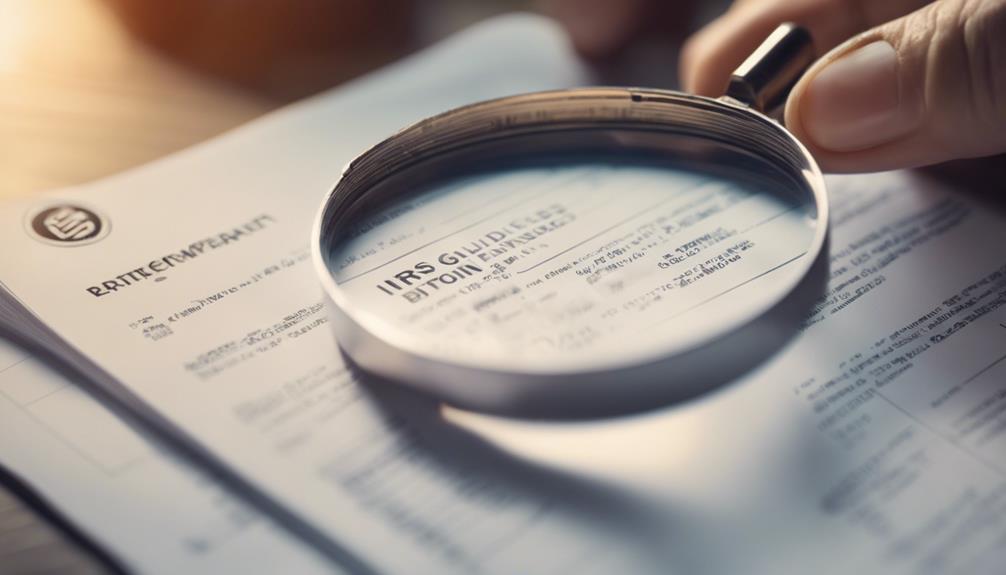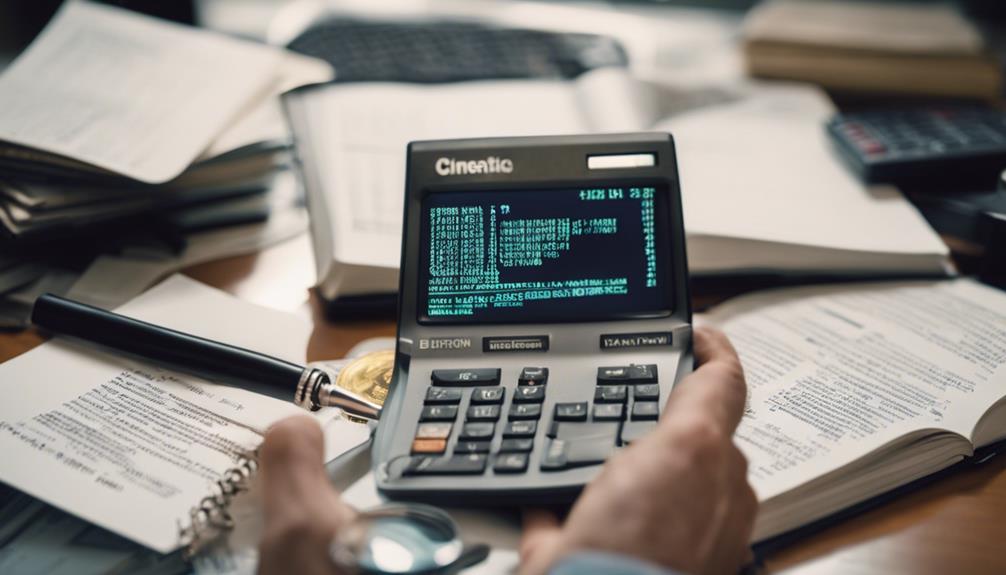To explore IRS rules on Bitcoin IRAs, keep in mind the advantages like tax-free growth and deferral until retirement. By transferring old accounts, connecting to an exchange, and funding with transfers, you can start diversifying with over 50 cryptocurrencies while staying within contribution limits. In the long run, benefit from tax-free growth, retire with tax-free withdrawals, and steer clear of capital gains taxes. Be mindful of state residency as tax rates vary. Implementing these tactics maximizes tax benefits for a secure retirement. Find out more about maximizing benefits in the cryptocurrency investment world to make informed decisions. Discover hidden secrets and tips that can help you secure a financially stable future.
Key Takeaways
- Utilize Roth accounts for tax-free growth and withdrawals in Bitcoin IRAs.
- Diversify with over 50 cryptocurrencies for enhanced portfolio resilience.
- Understand tax-efficient contributions to Bitcoin IRAs for long-term benefits.
- Leverage self-directed IRAs for flexibility in managing crypto investments.
- Ensure compliance with IRS guidelines for maximizing tax advantages in Bitcoin IRAs.
Benefits of Bitcoin IRAs

Bitcoin IRAs offer investors the potential for tax-free growth and withdrawals at retirement age. Unlike traditional IRAs, such as a Roth IRA, where contributions are made with post-tax income, Bitcoin IRAs allow you to invest with pre-tax dollars. This means that any gains within your Bitcoin IRA can grow tax-free until you withdraw them at retirement age. By leveraging the benefits of a Bitcoin IRA, you can potentially avoid paying income tax on the growth of your investments, providing a significant advantage over taxable accounts.
Investing in Bitcoin through a traditional brokerage account would subject you to income tax on any gains when you sell your cryptocurrency. However, by holding Bitcoin within a Bitcoin IRA, you can defer paying taxes on those gains until you start taking distributions in retirement. This tax deferral can result in substantial savings over time, making Bitcoin IRAs a compelling option for long-term wealth accumulation.
Tax Advantages for Cryptocurrency Investments

When considering cryptocurrency investments in retirement accounts, you can benefit from significant tax advantages that allow for tax-free growth and withdrawals at retirement age. One of the most advantageous retirement accounts for investing in cryptocurrencies is a Roth IRA. By utilizing a Roth IRA, investors can avoid paying long-term capital gains taxes on their cryptocurrency gains held within the account. It's important to note that tax rates on cryptocurrency investments in retirement accounts can vary based on state residence. All profits from cryptocurrency investments in a Roth IRA can be kept without any tax implications, providing a substantial advantage over personal investments. This tax-efficient strategy can lead to significant tax savings over time, making Roth IRAs an attractive option for individuals looking to invest in cryptocurrencies for their retirement.
| Tax Advantages for Cryptocurrency Investments | |
|---|---|
| Tax-free growth of investments | Tax-free withdrawals at retirement age |
| Avoidance of long-term capital gains taxes | Significant tax savings compared to personal investments |
Setting Up a Crypto IRA

To establish a Crypto IRA, consider rolling over your existing retirement accounts like IRAs or 401ks to a self-directed IRA. By doing this, you can take advantage of the benefits that come with managing your retirement funds in a more flexible manner. Here are some key steps to set up a Crypto IRA effectively:
- Roll Over Old Retirement Accounts: Transfer funds from your traditional retirement account into a self-directed IRA to begin your Crypto IRA journey.
- Link to a Reputable Exchange Wallet: Connect your Crypto IRA to a wallet on a trusted exchange such as Gemini for secure storage of digital assets.
- Tax-Free Rollover Process: Moving funds to a Crypto IRA incurs no taxes or penalties, ensuring a smooth handover for your investments.
Following these steps can help you establish a Crypto IRA seamlessly, allowing you to start investing in cryptocurrencies within a self-directed retirement account structure.
Funding Your Bitcoin IRA

You can fund your Bitcoin IRA by transferring funds from an existing retirement account or making direct contributions, following IRS contribution limits.
Another option is to fund your Bitcoin IRA using cryptocurrency by transferring supported digital assets.
Make sure the custodian or provider you choose supports your preferred funding method to guarantee a smooth transfer process.
Funding Options Available
Consider various options to fund your Bitcoin IRA, such as rollovers from existing retirement accounts or direct contributions from personal savings. When looking to invest in a crypto IRA, it's important to explore the funding avenues available to you.
Here are three key ways to fund your Bitcoin IRA:
- Rollovers from Retirement Accounts: Transfer funds from existing retirement accounts like IRAs or 401(k)s into your Bitcoin IRA for seamless investment growth.
- Direct Contributions: Make direct contributions from your personal savings or other investment accounts to boost your Bitcoin IRA's potential.
- Transfers from Cryptocurrency Wallets: Fund your Bitcoin IRA by transferring cryptocurrencies from other wallets or exchanges, expanding your investment portfolio.
IRA Contribution Limits
How do the IRA contribution limits impact your ability to fund your Bitcoin IRA within IRS guidelines?
The annual contribution limit for IRAs in 2021 is $6,000 for individuals under 50 years old and $7,000 for those 50 and older. When investing in crypto through a Bitcoin IRA, these contributions count towards your overall IRA limit.
Traditional IRAs may offer tax-deductible contributions, depending on income and other factors. On the other hand, Roth accounts allow after-tax contributions, potentially leading to tax-free withdrawals during retirement.
Understanding these limits is crucial for effectively managing your Bitcoin IRA within IRS regulations. Make sure to stay within the contribution boundaries to conform and maximize the benefits of your retirement savings.
Alternative Investment Strategies

An LLC owned by a self-directed IRA can facilitate alternative investment strategies in cryptocurrencies. By taking advantage of this setup, you can diversify your IRA investments into the digital assets market.
Here are three key ways to maximize your alternative investment strategies in crypto IRAs:
- Establish an LLC: Setting up a limited liability company (LLC) owned by your self-directed IRA allows you to navigate the complexities of investing in cryptocurrencies within a tax-advantaged account.
- Utilize Business or Institutional Accounts: Opening accounts specifically designed for businesses or institutions can provide you with the platform needed to venture into the crypto market with your IRA funds.
- Conduct Fiat-to-Crypto Conversions: Platforms like Kraken offer a seamless process for converting traditional fiat currency into cryptocurrencies, enabling you to strategically allocate your IRA funds into digital assets.
Long-Term Tax Considerations

When planning for long-term tax implications in your Bitcoin IRA, focus on the advantages of tax-free growth and withdrawals at retirement age. Investing in a Bitcoin IRA offers the advantage of tax-free growth, allowing your investments to potentially increase without incurring immediate tax liabilities. Additionally, when you reach retirement age and start making withdrawals from your Bitcoin IRA, you can enjoy the benefit of tax-free withdrawals, which can greatly enhance your retirement income.
One key benefit to keep in mind is the ability to avoid long-term capital gains taxes on the gains made within your Bitcoin IRA. By utilizing this tax-advantaged account, you can potentially save a substantial amount of money that would have otherwise gone towards paying taxes on your investment gains.
Remember that tax rates may vary based on your state residence when you withdraw funds from your Bitcoin IRA, so it's crucial to consider these factors in your long-term tax planning strategy. By keeping your profits within your Bitcoin IRA, you can maximize your tax savings and secure a more financially stable retirement.
Maximizing Retirement Savings Potential

Investing in a Bitcoin IRA can help maximize your retirement savings potential by offering tax advantages on your cryptocurrency investments.
By diversifying your portfolio through a Bitcoin IRA, you can explore different investment options while aiming for long-term growth.
Understanding strategies to optimize growth potential within a Bitcoin IRA can pave the way for a more secure financial future.
Tax Advantages Explained
Maximizing your retirement savings potential with a Bitcoin IRA offers tax advantages that allow for tax-free growth and withdrawals at retirement age. To fully grasp the benefits, consider the following points:
- Investing in Bitcoin through a Roth IRA or Roth 401k provides a way to accumulate wealth over the long term without being taxed on your gains.
- Holding over 50 cryptocurrencies in a Bitcoin IRA allows for diversification, potentially leading to substantial returns.
- Making contributions to a Bitcoin IRA without penalties offers a tax-efficient strategy for participating in the cryptocurrency market while safeguarding your retirement savings.
Investment Diversification Options
Diversifying your investment portfolio with a Bitcoin IRA opens up a world of opportunities for maximizing your retirement savings potential. With crypto IRAs, you have access to over 50 cryptocurrencies for investment diversification, allowing you to potentially benefit from the long-term growth these assets offer. Roth IRAs and Roth 401(k)s can further enhance your savings by providing tax-free growth on diversified crypto investments. By utilizing a self-directed IRA to invest in various cryptocurrencies, you can strengthen your portfolio's diversification, reducing risk and increasing potential returns. This unique opportunity provided by crypto IRAs allows you to expand your retirement savings beyond traditional assets, ensuring a well-rounded and resilient investment strategy.
| Investment Diversification Options | Benefits of Crypto IRAs |
|---|---|
| Access to over 50 cryptocurrencies | Potential for long-term growth |
| Tax-free growth with Roth accounts | Enhanced portfolio diversification |
| Self-directed IRA flexibility | Opportunity to reduce risk |
| Expansion beyond traditional assets | Resilient retirement savings |
Growth Potential Strategies
To enhance your retirement savings potential with a Bitcoin IRA, consider implementing growth strategies that leverage tax-free benefits and long-term wealth accumulation opportunities. Here are three key strategies to maximize your retirement savings:
- Utilize a Roth IRA or Roth 401k: By investing in Bitcoin through these accounts, you can benefit from tax-free growth and withdrawals at retirement age, allowing your wealth to grow without incurring additional taxes.
- Take Advantage of Self-Directed IRAs: Opting for a self-directed IRA to invest in Bitcoin enables you to capitalize on the crypto market's growth within a tax-advantaged retirement vehicle, ensuring your gains remain tax-free.
- Long-Term Tax Benefits: Holding Bitcoin in a retirement account shields you from long-term capital gains taxes, preserving all profits within the tax-advantaged account for enhanced wealth accumulation.
Future Trends in Crypto IRAs

In the pivotal landscape of Crypto IRAs, emerging trends signal a shift towards diversified investment options beyond the traditional domain of Bitcoin. Investors are increasingly looking at a broader range of cryptocurrencies and digital assets to include in their retirement accounts. This expansion of investment options reflects a growing recognition of the potential for diversification within Crypto IRAs.
Additionally, regulatory importance plays a key role in shaping the future of Crypto IRAs. As the IRS provides more guidance and regulations surrounding cryptocurrency investments, individuals are gaining a better understanding of how to navigate the tax implications and compliance requirements within this space. Financial institutions and retirement account providers are also showing a heightened interest in offering Crypto IRAs to meet the evolving demands of investors. This increased focus on regulation ensures a more secure and transparent environment for investors, fostering trust in Crypto IRAs as a viable retirement planning option. To maintain credibility and align with the evolving landscape, many providers are now emphasizing the need for regular bitcoin ira compliance audit procedures to ensure adherence to IRS guidelines and industry standards. Such measures not only protect investors but also strengthen the infrastructure supporting cryptocurrency-based retirement accounts.
Moreover, the integration of blockchain technology is expected to enhance the security and transparency of transactions within Crypto IRAs, providing investors with increased confidence in this alternative investment option.
Frequently Asked Questions
What Are the IRS Rules for Bitcoin?
The IRS rules for Bitcoin state that it's treated as property for tax purposes. When holding Bitcoin in an IRA, it must adhere to IRS regulations on prohibited transactions.
To purchase Bitcoin within an IRA, a self-directed IRA is required as direct purchases aren't allowed. Proper record-keeping and reporting of Bitcoin transactions within an IRA are important to prevent penalties.
IRA custodians must strictly follow IRS guidelines to guarantee compliance.
What Are the Tax Rules for Bitcoin?
When dealing with taxes on Bitcoin, it's important to recognize that the IRS treats Bitcoin as property, subjecting it to capital gains tax rules. You should report gains or losses from Bitcoin transactions on your tax returns.
Holding Bitcoin for over a year may qualify you for lower long-term capital gains tax rates. Remember, accurately tracking your cost basis and reporting it during Bitcoin sales is your responsibility.
The IRS also requires reporting any income received in the form of Bitcoin.
How Does the IRS Know if I Made Money on Bitcoin?
The IRS monitors Bitcoin gains through exchanges and blockchain analysis. If you profit from Bitcoin, you must report it on your tax return. Not reporting can lead to penalties and audits.
The IRS may ask for documentation like transaction records. Using a Bitcoin IRA offers a vital way to invest in cryptocurrency while complying with IRS rules.
It's important to follow guidelines and report gains accurately to avoid legal consequences.
Do You Have to Pay Taxes on Bitcoin if You Don't Cash Out?
If you hold onto Bitcoin without converting it to cash, you aren't required to pay taxes on the unrealized gains. Taxes only come into play when you sell Bitcoin for traditional currency or use it for purchases.
The IRS views Bitcoin as property, subjecting it to capital gains tax when you sell or trade it. By adopting a HODL strategy and refraining from selling, you can delay tax obligations until you decide to sell your Bitcoin.
Conclusion
In summary, understanding the IRS guidelines on Bitcoin IRAs is essential for maximizing your retirement savings potential. By taking advantage of the tax benefits and alternative investment strategies offered, you can secure a brighter financial future.
Keeping long-term tax considerations in mind and staying informed about future trends in Crypto IRAs will help you navigate the ever-changing landscape of cryptocurrency investments.
Make informed decisions to guarantee a stable financial future for yourself.









